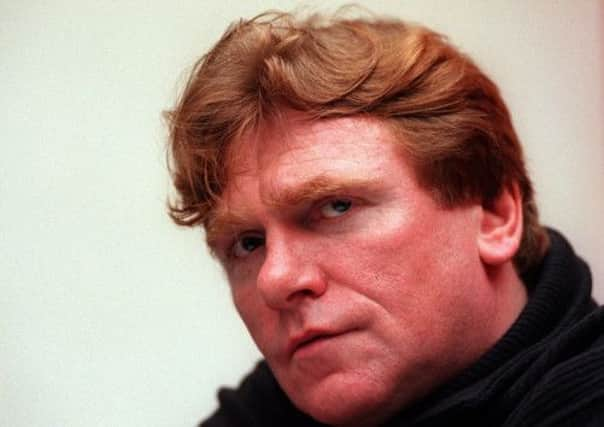Obituary: Gerard Murphy, actor and director


THE actor Gerard Murphy, who has died after a two-year struggle with cancer, was one of the leading members of the great Citizens’ Theatre Company of the 1970s and 1980s, a warm and brilliant stage performer who went on to forge a hugely successful career as an actor, director and translator, becoming an associate artist of the Royal Shakespeare Company, and playing “heavy” villains in films such as Waterworld and Batman Begins.
Gerard Murphy was born in Newry, County Down, the eldest son of a marine engineer who first went to sea at the age of 12, and a mother who was very much involved in the amateur arts scene in the town. He began to perform at an early age; at five or six years old, he became a leading light of recitals staged by the local elocution teacher, Ethel Fitzpatrick, and he remained interested in theatre, music and the arts throughout his secondary education at the Christian Brothers-run Abbey Grammar School in Newry, becoming a fine pianist as well as an actor in school productions.
Advertisement
Hide AdAdvertisement
Hide AdHe was a brilliant student, and in 1966 moved on to Queen’s University, Belfast, where he studied English, psychology and social anthropology, and became closely involved in the work of the city’s Lyric Theatre.
After he graduated, though, he decided to seek his fortune as an actor in London; and in 1974, he was cast for the first time in a production at the Citizens’ Theatre in Glasgow, at a time when Giles Havergal’s company – co-directed with Philip Prowse and Robert David McDonald – was becoming a Europe-wide sensation for its brilliant, radical, and visually stunning productions of a dazzling series of European classics. Murphy played Macbeth opposite David Hayman’s Lady Macbeth in Havergal’s famous cross-dressing production of the 1970s, and gave an outstanding performance, still remembered by thousands who saw it, as Diaghilev in Robert David McDonald’s 1977 play Chinchilla, in which the Citizens’ triumvirate used the story of Diaghilev’s Ballets Russes, stranded on the Venice Lido in the 1920s, to set out their powerful artistic creed.
“What I remember about Gerard,” says Giles Havergal, “is this sense of huge animal energy, and a terrific hunger for life and for knowledge, matched with a great, sharp mind. He was a very emotional actor, with a great ability to express emotion on stage, but also a thinking man, with tremendous stage technique. And he was a vital part of that company, not only a great performer, but such a warm person, full of fun and generosity, and all the joys of life.”
After 1977, Gerard Murphy appeared less regularly in Glasgow, and moved on to develop his relationship with the Royal Shakespeare Company and other major British companies, becoming an RSC associate artist; he played opposite Judi Dench in a 1980 production of Juno and the Paycock, and also directed for the company in London and Stratford.
He was also a master of other media. His radio credits include the superb narration for the famous BBC Radio version of Lord of the Rings, and on television he appeared in classic adaptations and series including Vanity Fair, Waking The Dead, Trial And Retribution, and Spooks. His film career – which once, to his surprise, led to a whole year’s residence in Hollywood and Hawaii – saw him play the Nord in Waterworld, and the corrupt judge Faden in Batman Begins.
In recent years – despite taking substantial breaks to help care for his increasingly frail mother, who died in 2006 – Gerard Murphy gave some memorable final stage performances, replacing the great Richard Griffiths in a 2010 touring production of Alan Bennett’s The History Boys, about an ageing grammar-school teacher whose relationship with his pupils oversteps the bounds of propriety; and in 2012, despite his illness, he made a last appearance at his beloved Citizens’ Theatre, in a magnificent performance of the Samuel Beckett monologue Krapp’s Last Tape, which won him a Critics’ Award For Theatre In Scotland nomination for Best Male Performance of the year. He attended the CATS award ceremony in Edinburgh in June of this year, and said afterwards that the event had been a glorious day for him, a kind of homecoming.
“Everyone knows that Gerard was a wonderful actor,” said his agent Lynda Ronan, who became a close friend. “What people don’t always know, though, is what a wonderful, warm friend he was, such fun, so modest about his own achievements, so supportive of other people.
“When he was on tour with The History Boys, many of the young members of that company told me how much it had meant to them to work with him, how generous he was with his time and his knowledge.”
Advertisement
Hide AdAdvertisement
Hide AdAnd his sister Deirdre, now a headteacher in Cambridge, adds her tribute. “He was a brilliant man and a wonderful brother, and in a way he didn’t know it, he was so modest about his own gifts. But I know the difference he made to my life, giving me so much support to fulfil my potential. And I know that he did that for many others, too.”
Gerard Murphy is survived by his beloved sister and brother, Deirdre and Brian, and by five nieces and nephews; and also by an army of loving colleagues and friends, who will miss his brilliance, his warmth, his wit, his love of language and his relish for life, but above all his friendship, which he gave without stint, and which perhaps forms as significant a legacy as his great body of creative work, on film, television and radio, and across the world of British theatre.
JOYCE MCMILLAN